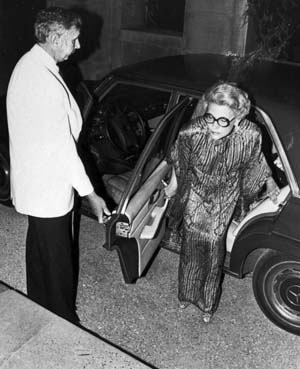
By VERENA DOBNIK
NEW YORK
Martha “Sunny” von Bulow, an heiress who spent the last 28 years of her life in oblivion after what prosecutors alleged in a pair of sensational trials were two murder attempts by her husband, died Saturday at age 76.
She died at a nursing home in New York, her children said in a statement issued by family spokeswoman Maureen Connelly.
Martha von Bulow was a personification of romantic notions about high society – a stunning heiress who brought her American millions to marriages with men who gave her honored old European names.
But she ended her days in a coma, showing no sign of awareness as she was visited by her children and tended around the clock by nurses.
In the 1980s, she was the offstage presence that haunted her husband’s two sensational trials in Newport and Providence, R.I.
At the first trial, in 1982, Claus von Bulow was convicted of trying twice to kill her by injecting her with insulin at their estate in Newport, R.I. That verdict was thrown out on appeal, and he was acquitted at a second trial in 1985.
The murder case split Newport society, produced lurid headlines and was later made into a film, “Reversal of Fortune,” starring Glenn Close and Jeremy Irons.
Claus von Bulow is now living in London, “mostly taking care of his grandchildren,” said Alan Dershowitz, the defense lawyer who won his acquittal at the second trial.
“I’m sure Claus is very sad today,” he said. The lawyer called Sunny von Bulow’s death “a sad ending to a sad tragedy that some people tried to turn into a crime. It was never a crime.
“There are no winners in a case like this. I’m happy to have played a role in getting the criminal conviction reversed because it was an unjust conviction, but there were no victory parties or celebrations afterwards because there was a woman in a coma,” Dershowitz said.
Claus von Bulow’s main accusers were his wife’s children from a previous marriage, Princess Annie Laurie von Auersperg Kniessl and Prince Alexander von Auersperg. They renewed the charges against their stepfather in a civil lawsuit a month after his acquittal.
Two years later, Claus von Bulow agreed to give up any claims to his wife’s estimated $25 million-to-$40 million fortune and to the $120,000-a-year income of a trust she set up for him. He also agreed to divorce her, leave the country and never profit from their story.
Sales of Martha von Bulow’s property brought $4.2 million from her oceanfront estate in Newport, $6.25 million from her 12-room apartment on Fifth Avenue in Manhattan, and $11.5 million from the art and antiques from the homes.
Prosecutors contended that Claus von Bulow wanted to get rid of his wife to inherit a large chunk of her wealth and be free to marry a mistress. The defense countered by painting Martha von Bulow, who suffered from low blood sugar, as an alcoholic and pill popper who drank herself into a coma.
Claus Von Bulow was accused of injecting his wife with insulin first in December 1979, causing a coma from which she revived. Prosecutors said he tried again a year later, on Dec. 21, 1980, and the 49-year-old heiress fell into an irreversible coma.
Her world was reduced to a private, guarded room in the Harkness Pavilion and later the McKeen Pavilion of Columbia-Presbyterian Medical Center. She died at the Mary Manning Walsh Nursing Home, her family said.
Her doctor testified that the cost of maintaining her was $375,000 the first year, 1981.
No figures were available for the years that followed, but by the early 1990s, room charges were up to about $1,500 a day – $547,000 a year – plus $200,000 to $300,000 for round-the-clock private nursing.
She was born Martha Sharp Crawford aboard a railcar in Manassas, Va., on Sept. 1, 1932, daughter of utilities tycoon George Crawford, who died when she was 4.
“Sunny,” nicknamed for her disposition, was raised by her mother in New York City.
While touring Europe with her mother, she met Prince Alfred von Auersperg, who was younger, penniless and working as a tennis pro at an Austrian resort catering to rich Americans. They were married in 1957 and divorced eight years later after she returned alone to New York with their young son and daughter.
On June 6, 1966, she married von Bulow, who then quit his job as an aide to oilman J. Paul Getty. He could not immediately be reached for comment Saturday.
Associated Press writers Jay Lindsay in Boston and Raphael G. Satter in London contributed to this report.








